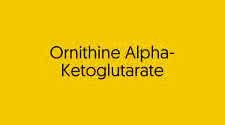What Ever Happened to the Supplement OKG - Does it Provide Results?

Advanced Nutrition is Essential for Advanced Results
Several years ago, a designer amino-acid food supplement, ornithine alpha-ketoglutarate (OKG), was introduced into the bodybuilding market with great fanfare. Its promise
originated from European studies (mainly those performed in France, where the compound was developed) that indicated OKG had salutary effects in treating a number of
serious catabolic conditions.
Those conditions included severe burns, post surgical recovery, liver and kidney disease, and wound healing. Since the common biological denominator in these medical
problems involves a huge loss of protein, OKG was enthusiastically viewed as a potent natural promoter of increased muscle-protein synthesis. Some marketers of the
substance even hinted at possible steroid like effects that would aid in muscle building. OKG also promotes the release of growth hormone, as does one of its components,
ornithine.
OKG consists of two ornithine molecules bound to one alpha-ketoglutarate molecule. The binding is vital, since taken separately, neither ornithine nor alphaketoglutaratc
have the same activity as properly bound OKG in body tissues. For example, OKG but not ornithine alone promotes the release of insulin, an anabolic hormone.
The suggested dosage of OKG to induce anabolic hormone release was a minimal 10 grams taken in its entirety. That amount, however, was based on studies in human subjects
who didn't exercise. Researchers simply extrapolated the data from the non-exercising subjects to the athletic market, including bodybuilders.
Research methods aside, OKG has a major problem - the taste of the substance is utterly disgusting. It is so harsh and so potent that no manner of flavoring disguises it.
The initial excitement surrounding OKG (similar to the current hype about another amino-acid byproduct, HMB) soon gave way to disappointment. Strength athletes who
anticipated rapid muscular progress after using it were left with a bad taste in their mouths - literally and figuratively.
Does this mean that OKG doesn't work as promised? The plethora of studies showing that OKG does appear to offset various catabolic conditions involving severe protein loss
can't be denied. A recent animal study has further cleared up some of the confusion surrounding OKG usage. This work, as reported in the American Journal of Physiology
(273:E557-E563, 1997), utilized severely burned, and thus catabolic, lab rats. The rats were given five grams of OKG per kilogram of bodyweight per day. Results showed that
the OKG increased protein synthesis in the animals' intestines and liver. It did not increase protein synthesis in muscles, but it did have an anticatabolic effect in
preventing muscle-tissue loss.
The AJP report also confirmed previous findings about OKG, including the fact that it promotes synthesis of the vital amino acid glutamine, which in turn increases muscle-protein
synthesis. OKG also helps generate compounds called polyamines that are involved in cell renewal and protein synthesis.
It would be nice to see a controlled study of OKG in hard-training athletes. The compound does seem to offer a degree of anticatabolic activity in muscle and may indirectly
aid muscle-protein synthesis. After proving that it works in humans who exercise, the next hurdle would be overcoming the taste of the stuff.